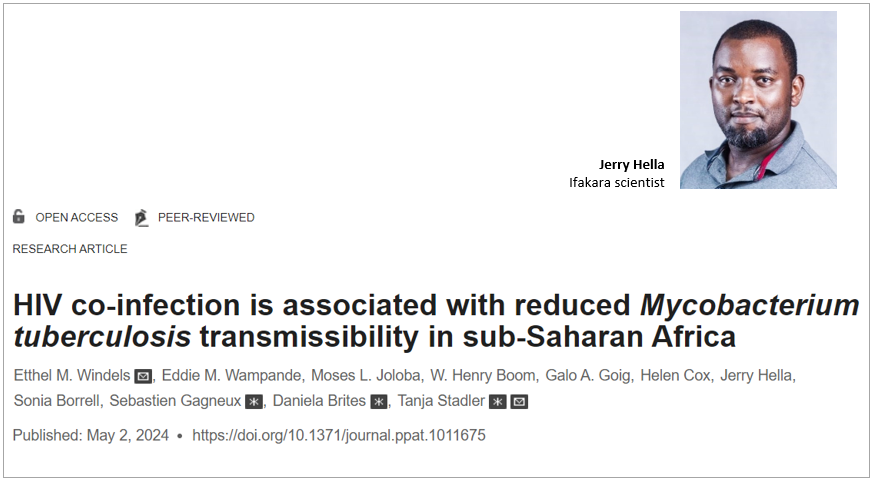
MILESTONE: HIV-positive individuals less likely to spread TB

A recent study has found that people living with HIV are less likely to spread the bacterium that causes tuberculosis (TB) to others, compared to those without the virus.
The findings, published on the PLOS Pathogens journal, highlight the relationship between HIV and TB transmission dynamics.
To examine this relationship, a group of scientists from Europe and Africa, including Dr. Jerry Hella from Ifakara Health Institute, conducted an analysis of genomic datasets of TB-causing bacteria (Mtb) from four sub-Saharan African countries – Malawi, South Africa, Tanzania, and Uganda.
The primary objective of the study was to determine the extent to which HIV-infected individuals contribute to spreading TB by comparing genetic sequences from both HIV-negative and HIV-positive TB patients.
Understanding the HIV-TB relationship
Findings showed that individuals co-infected with HIV and TB are at a higher risk of developing active TB compared to those with TB alone. This highlights the critical role of HIV in fueling TB epidemics in areas with high HIV incidence, such as sub-Saharan Africa.
“Taken together, our results demonstrate that a high HIV prevalence can fuel a TB epidemic by increasing the risk for TB disease progression in HIV-positive individuals, but that these individuals do not proportionally contribute to further Mtb transmission.”
Furthermore, the scientists suggest that HIV-positive TB cases are primarily considered as ‘sinks’ in transmission chains, while TB cases in HIV-negative individuals are the major ‘sources’ of transmission within communities.
What do these findings mean and its implications?
According to scientists, these findings challenge previous assumptions about TB transmission dynamics in the context of HIV and have important implications for public health strategies aimed at controlling both epidemics.
They underscore the complexity of infectious disease interactions and the need for tailored approaches to combat TB in populations with high HIV prevalence.
They noted that, since the introduction of HIV, many sub-Saharan African countries have experienced a significant rise in TB incidence, indicating a strong interplay between the two epidemics.
“HIV infection is recognized as an important risk factor for developing TB, but the contribution of HIV-infected TB cases to further Mtb transmission is poorly understood. In this study, we analyzed four sets of Mtb genomic sequences collected in different countries…aimed at inferring transmission dynamics within and between different host populations,” wrote the scientists.
“While our findings support that HIV is a strong risk factor for TB, we show that HIV-positive TB cases generate a significantly lower number of secondary TB cases than HIV-negative cases. This suggests that HIV-positive cases mainly act as sinks in Mtb transmission chains, while HIV-negative cases are a major source of transmission,” they added.
The call for targeted interventions
In light of these findings, the scientists emphasize the importance of targeted interventions to address TB in populations without HIV, aiming to detect and treat TB cases early to prevent further transmission.
“Our findings have implications for TB control, and call for particular attention to HIV-negative TB cases, ideally through active case finding, thereby ensuring that these cases are diagnosed and treated as early as possible to prevent further spread of the disease.”
The study also underscores the need for continued research and collaborative efforts to develop tailored TB control measures that account for the specific challenges posed by HIV co-infection.
Authors of the study
The study, a collaborative effort involving scientists from Switzerland, Uganda, the USA, South Africa, and Tanzania, was led by Etthel Windels and Tanja Stadler from ETH Zürich.
Other contributors included Eddie Wampande and Moses Joloba from Makerere University, Henry Boom from Case Western Reserve University, Galo Goig, Sonia Borrell, Sebastien Gagneux, and Daniela Brites from Swiss TPH, Helen Cox from the University of Cape Town, and Jerry Hella from Ifakara Health Institute.
Read the publication here.
